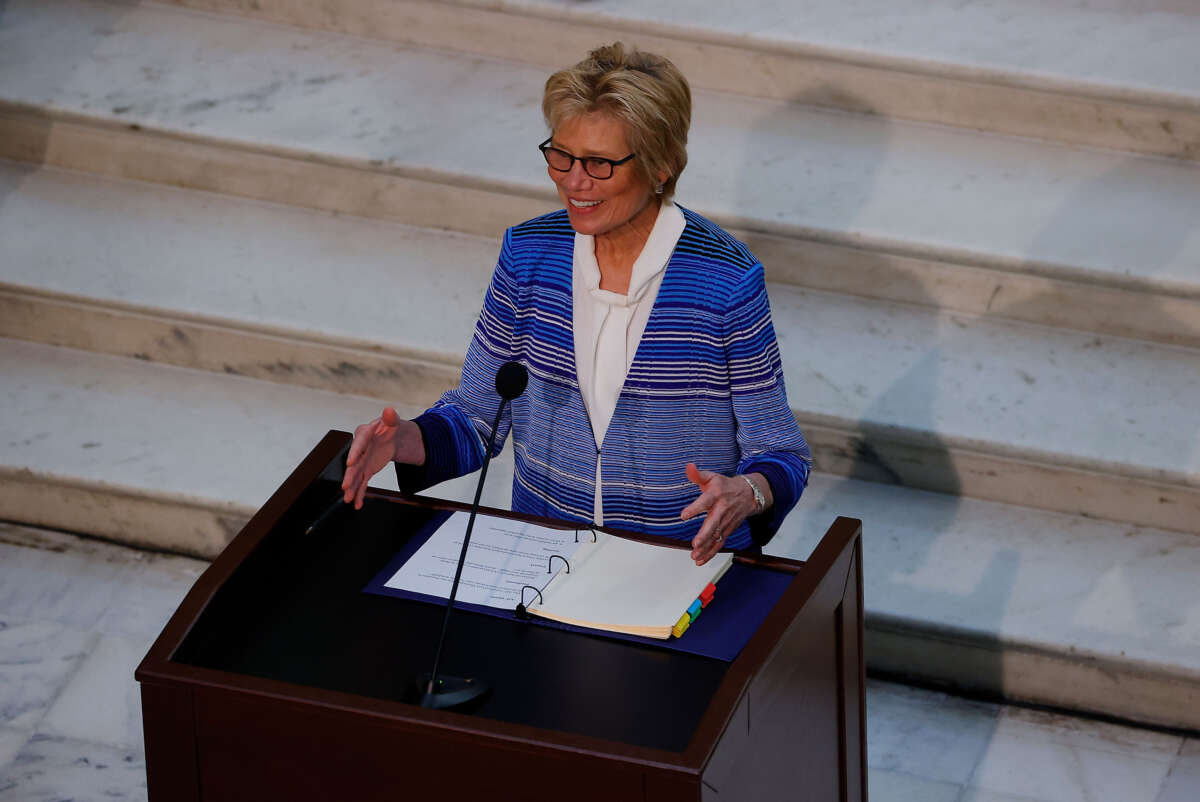A commission of health experts in Georgia was disbanded earlier this month following national reporting on its findings that two state residents died because they were denied access to an abortion.
Kathleen Toomey, commissioner of the Georgia Department of Health, dismissed every member of the Maternal Mortality Review Committee, which is charged with examining and determining the causes of pregnant people’s deaths in the state. The dismissal was reported late last week.
The decision to dismiss the board’s membership was prompted by reporting from ProPublica, Toomey explained in a statement, which had published an article in September about the deaths of Amber Thurman and Candi Miller, two pregnant women who died as a result of Georgia’s abortion ban. After failing to determine whether any member of the board had provided ProPublica with the details of those individuals’ deaths, Toomey said she made the decision to disband the board completely.
Said Toomey:
Confidential information provided to the Maternal Mortality Review Committee was inappropriately shared with outside individuals. Even though this disclosure was investigated, the investigation was unable to uncover which individual(s) disclosed confidential information. Therefore, effective immediately the current MMRC is disbanded, and all member seats will be filled through a new application process.
Toomey added that there might be new procedures “for on-boarding [new] committee members” in the future. In response to concerns over how long the committee would not exist, Toomey admitted that it could be several weeks before officials start reviewing applications for a new commission.
Every state has a board overseeing pregnancy deaths that is similar to Georgia’s Maternal Mortality Review Committee — and since the U.S. Supreme Court overturned the abortion protections established by Roe v. Wade, several states have politicized their boards. In Texas, for example, an individual was recently appointed to the state board who has previously stated their belief that embryos have personhood rights and that children as young as 9 years old can safely carry a pregnancy to term. And in Idaho, the state board was dissolved last year, when Republicans in the state legislature failed to renew legislation keeping it in place. (The Idaho board was only reestablished in the past month.)
After the publication of the ProPublica article, the two deaths in Georgia made national headlines and became a central part of the presidential campaign, with Vice President Kamala Harris including Thurman’s story in a television ad featuring her family members, who cast blame on former President Donald Trump for appointing the Supreme Court justices who dismantled federal abortion protections.
Several abortion rights advocates condemned Toomey for her apparent retaliatory action against the Georgia Maternal Mortality Review Committee.
“They did what they were supposed to do. This is why we need them,” said Monica Simpson, executive director of SisterSong, a reproductive justice organization that amplifies the voices of Black and Indigenous women. “To have this abrupt disbandment, my concern is what we are going to lose in the process, in terms of time and data?”
Alicia Stallworth, Director of Georgia Campaigns at Reproductive Freedom for All, described Toomey’s move as “a scare tactic meant to stop full investigations into the circumstances of pregnant women’s deaths across the state.”
“Now more than ever, it’s important to mobilize against anti-abortion extremists like Governor Kemp, who are responsible for these deadly bans,” Stallworth added.
“This is yet another attempt to conceal the deadly consequences of Georgia’s Republican abortion ban,” Democratic Rep. Nikema Williams said in a statement. “Coupled with the silencing of experts on maternal health, this move threatens Georgia’s ability to tackle systemic inequities that have plagued our healthcare system for far too long.”
Jessica Valenti, a journalist who covers abortion, expressed skepticism regarding any board Georgia lawmakers establish in the future.
“I guarantee you that when Georgia replaces those seats on the maternal mortality review committee, they’re going to put anti-abortion activists on there,” Valenti wrote on X.
Our most important fundraising appeal of the year
December is the most critical time of year for Truthout, because our nonprofit news is funded almost entirely by individual donations from readers like you. So before you navigate away, we ask that you take just a second to support Truthout with a tax-deductible donation.
This year is a little different. We are up against a far-reaching, wide-scale attack on press freedom coming from the Trump administration. 2025 was a year of frightening censorship, news industry corporate consolidation, and worsening financial conditions for progressive nonprofits across the board.
We can only resist Trump’s agenda by cultivating a strong base of support. The right-wing mediasphere is funded comfortably by billionaire owners and venture capitalist philanthropists. At Truthout, we have you.
We’ve set an ambitious target for our year-end campaign — a goal of $250,000 to keep up our fight against authoritarianism in 2026. Please take a meaningful action in this fight: make a one-time or monthly donation to Truthout before December 31. If you have the means, please dig deep.
